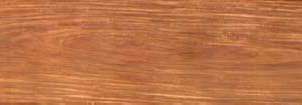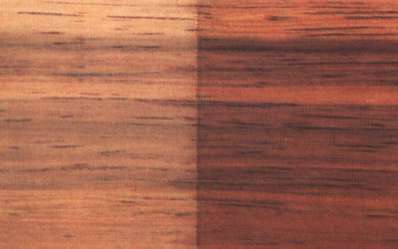   
Muninga (Pterocarpus angolensis)
Family: Leguminosae
Common names: Ambila, Bloodwood, Brown African padauk, Girassonde, Imbilo, Kajaat, Kajat, Kajatenhout, Kejaat, Kiaat, Kiatt, Maninga, Mavamaropa, Mbila, Mlombwa, Mninga, Moroto, Mtumbati, Mukurambira, Mukwa, Mulambi, Mulombe, Mulombwa, Munhaneca, Muninga, Mutete, Mututi, Muzwamaloa, N'dombe, Rhodesian walnut, Sealing wax tree, Thondo, Thondu, Thordo, Transvaal kajatenhout, Umbila, Umvagaz, Umvangazi
Distributed in: Angola, Botswana, Kenya, Malawi, Mozambique, Namibia, South Africa, Tanzania, Zaire, Zambia, Zimbabwe (Africa)
Distribution overview: The species occurs widely throughout south-central Africa, and is commonly found in savannah woodland.
Common uses: Agricultural implements, Beehives, Boat building (general), Boat building, Boat building: decking, Boat building: framing, Boxes and crates, Broom handles, Cabinetmaking, Canoes, Carvings, Chairs, Chests, Coffins, Concealed parts (Furniture), Decorative veneer, Desks, Dining-room furniture, Domestic flooring, Dowell pins, Dowells, Drawer sides, Excelsior, Figured veneer, Fine furniture, Floor lamps, Flooring, Flooring: commercial heavy traffic, Furniture , Furniture components, Furniture squares or stock, Furniture, Hatracks, Heavy construction, Joinery (external): ground contact, Joinery, Kitchen cabinets, Lifeboats, Light construction, Living-room suites, Mathematical instruments, Medicinal use, Mine timbers, Musical instruments, Musical instruments: percussion, Office furniture, Paneling, Parquet flooring, Plywood, Pulp/Paper products, Radio - stereo - TV cabinets, Railroad ties, Rustic furniture, Shipbuilding, Sporting Goods, Stools, Sub-flooring, Tables , Tool handles, Toys, Turnery, Utility furniture, Vehicle parts, Veneer, Veneer: decorative, Wardrobes, Wheel spokes, Wheels
Environment profile: Rare
Tree size: Trunk diameter is 100-150 cm
Colors: the heart isWhite, Yellow to golden-yellow to orangeand the sapwoodWhite/Gray , Yellow.The grain isWavy, the textureMedium to coarseand the lusterSlightly lustrous
Natural durability: Susceptible to marine borer attack, Very durable
Odor: Fragrant odor
LightInduced Color Change: Lighter
Kiln Schedules: UK=J US=T10D5S/T8D4S Fr=4
Kiln Drying Rate: Very slow (>28 days for boards < 32 mm, to >84 days for boards >= 63 mm)
Drying Defects: Slight surface checking, Splitting
Ease of Drying: Reconditioning Treatement
Tree Identification: Bole/stem form is straight
Comments: General finishing qualities are rated as good General finishing qualities are rated as satisfactory Timber produced by species from Zimbabwe is generally lighter and softer than those from other African countries.
Blunting Effect: Slight to moderate buckles and splits
Boring: Fairly easy to very easy
Carving: Fairly easy with ordinary tools
Cutting Resistance: Satisfactory sawing characteristics
Gluing: Good gluing properties
Mortising: Finishes well
Moulding: The end-grain, figure, or quartersawn material require special care
Movement in Service: The end-grain, figure, or quartersawn material require special care
Nailing: Possible if prebored, Thin-guage nails recommended
Planing: Reduction of cutting angle recommended
Resistance to Impregnation: Sapwood is resistant
Resistance to Splitting: Poor
Response to hand tools: Responds Readily
Routing recessing: Routing yields good results
Sanding: Fairly good sanding characteristics
Veneering qualities: Suitable for peeling, Suitable for slicing
Steam bending: Poor
Screwing: Possible if prebored, Screwing yields good results; Turning: Moderate blunting effect on cutting edges
Painting: Good; Polishing: Good; Staining: Stains well;
- Numerical data Metric
- Numerical data English
- Strength properties
- References
 |
 |
 |
 |
| Item |
Green |
Dry |
Metric |
| Specific Gravity |
0,52 |
0,59 |
|
| Density |
|
624 |
kg/m3 |
| Bending Strength |
842 |
1144 |
kg/cm2 |
| Crushing Strength |
|
103 |
kg/cm2 |
| Hardness |
|
709 |
kg |
| Impact Strength |
96 |
81 |
cm |
| Shearing Strength |
|
152 |
kg/cm2 |
| Stiffness |
77 |
92 |
1000 kg/cm2 |
| Tangential Shrinkage |
|
|
% |
| Radial Shrinkage |
2 |
|
% |
| Weight |
673 |
624 |
kg/m3 |
| Maximum Load |
0,7 |
0,84 |
cm-kg/cm3 |
| Toughness |
|
277 |
cm-kg |
| Static Bending |
|
549 |
kg/cm2 |
|
 |  |  |  | | Item | Green | Dry | English | | Bending Strength | 11978 | 16276 | psi | | Crushing Strength | | 1468 | psi | | Density | | 39 | lbs/ft3 | | Hardness | | 1564 | lbs | | Impact Strength | 38 | 32 | inches | | Maximum Crushing Strength | 5728 | 8354 | psi | | Shearing Strength | | 2171 | psi | | Static Bending | | 7820 | psi | | Stiffness | 1107 | 1318 | 1000 psi | | Toughness | | 241 | inch-lbs | | Work to Maximum Load | 10 | 12 | inch-lbs/in3 | | Specific Gravity | 0.52 | 0.59 | | | Weight | 42 | 39 | lbs/ft3 | | Radial Shrinkage | 2 | | % | | Tangential Shrinkage | 4 | | % | |
Density (dry weight) = 38-45 lbs/cu. ft. 0
Density (dry weight) = 31-37 lbs/cu. ft. 0
Max. crushing strength = medium 0
Density (dry weight) = 46-52 lbs/cu. ft. 0
Shrinkage, Tangential = very small 0
Shrinkage, Radial = very small 0
Modulus of Elasticity (stiffness) = very low 0
Max. crushing strength = high 0
Bending strength (MOR) = high 0
Hardness (side grain) = medium
Bending strength (MOR) = medium
Toughness-Hammer drop (Impact Strength) = medium
Toughness-Hammer drop (Impact Strength) = low
Toughness (total work) = medium
Shearing strength (parallel to grain) = medium
Max. crushing strength = low
Toughness (total work) = high
Shearing strength (parallel to grain) = high
Hardness (side grain) = hard
Toughness (total work) = low
Shearing strength (parallel to grain) = low
Resists denting and marring
Modulus of Elasticity (stiffness) = low
Heavy
Hardness (side grain) = soft
Density = high
Compression strength (parallel to grain) = high
Alan Schwartz.Rio Rivuma, Boston, MA.Personal Communication, 1993.Banks, C.H., Schoeman, J.P., Otto, K.P.,1977,The Mechanical Properties of Timbers with particular reference to South,Africa,South African Forestry Research Institute Bulletin,(Ed.,Schoeman, J.P. 1973 & Otto K.P. 1976,No.48Banks, C.H.,1954,The Mechanical Properties of Timbers with Particular Reference to those,grown in the Union of South Africa,Journal of the South African Forestry Association,No. 24 pp.44-65,[South,African Forestry Journal]Banks, C.H.,1970,The Durability of South African Wood and Wood Base Building Materials,South African Forestry Journal,No.75Bodig, J. and B. A. Jayne. 1982. Mechanics of Wood and Wood Composites. Van Nostrand Reinhold Company, New York.Bois, P.J.,1966,The Strength Properties of Tanzania Timbers,Tanzania Forest Div. Util. Sec. Moshi Tech. Note, No.35Bolza, E., Keating, W.G.,1972,African Timbers - the Properties, Uses and Characteristics of 700 Species,C.S.I.R.O. Div. of Building ResearchBolza, E.,1976,Timber and Health,Div. Building Res. C.S.I.R.O. AustraliaBrown, W.H.,1969,Properties and uses of Tropical hardwoods in the United Kingdom. Part 1,Nonstructural properties and uses.,Conference on Tropical hardwoods SC-5/TN-5, Syracuse UniversityBrown, W.H.,1978,Timbers of the World No.1 Africa,TRADA, Red Booklet SeriesBryce, J.M.,1967,Commercial Timbers of Tanzania,Tanzanian Forestry Division Util. Sec. MoshiChudnoff, M.,1984,Tropical Timbers of the World,U.S.A. Department of Agriculture, Forest Service, Forest Products,Laboratory, Madison.Clifford, N.,1953,Commercial Hardwoods - Their Characteristics Identification and,Utilization,Sir Isaac Pitman & Sons Ltd. LondonClifford, N.,1957,Timber Identification for the Builder and Architect,Leonard Hill (Books) LTD. LondonCox, H.A.,1939,A Handbook of Empire Timbers,Forest Products Research Laboratory, Princes RisboroughDesch, H.E.,1951,Manual of Commercial Timbers,The Author Crockham Hill, Kent,Vol.1Duff, C.E.,1944,Termite Resistance Test on the Copperbelt of Northern Rhodesia,Empire Forestry Journal,23(2,pp160-2Farmer, R.H.,1972,Handbook of Hardwoods,HMSOFindlay, W.P.K.,1938,The Natural Resistance to Decay of some Empire Timbers,Empire Forestry Journal,17,pp249 - 259Findlay, W.P.K.,1975,Timber: Properties and Uses,Crosby Lockwood Staples London,224PPFlamwell, C.T.,1958,The Working Properties of Brachystegia spiciformis,Tanzania Forest Division Util. Sec. Moshi Technical Note,No.10Forest Products Research Laboratory, U.K.,1945,A Handbook of Empire Timbers,Department of Scientific and Industrial Research Forest Products ResearchForest Products Research Laboratory, U.K.,1967,The Steam Bending Properties of various timbers,Forest Products Research Laboratory, Princes Risborough, Leaflet,No.45Forests Products Research Laboratory, U.K.,1956,A Handbook of Hardwoods,Forest Products Research Laboratory, Princes Risborough, Department of,Science and Industrial Research, Building Research EstablishmentHMSO.1972.Handbook of Hardwoods.2nd Edition.Revised by R.H. Farmer.Department of the Environment, Building Research Establishment, Princes Risborough Laboratory, Princes Risborough, Aylesbury, Buckinghamshire.Howard, A.L.,1948,A Manual of Timbers of the World.,Macmillan & Co. Ltd. London 3rd ed.Kukachka, B.F.,1970,Properties of Imported Tropical Woods,Forest Research Paper FPL 125Lavers, G. M. 1966.The Strength Properties of Timbers.Forest Products Research Bulletin, No. 50.Ministry of Technology, Her Majesty's Stationery Office, London.Lavers, G.M.,1983,The Strength Properties of Timber (3rd ed. revised Moore G.L.,Forest Products Research Laboratory, Princes Risborough, Building Research,Establishment Report (formerly Bulletin No.50)Lincoln, W.A. 1986. World Woods in Color. Linden Publishing Co. Inc., Fresno, California.McCoy-Hill, M.,1954,Timbers of Tanganyika - Brachylaena hutchinsii and Pterocarpus angolensis,Timber Technology,62(2185, p559Murira, K.,1984,Natural Durability Tests of Tanzanian Timbers 1955 - 1982,Tanzania Forestry Research Institute, Timber Utilisation Research Centre,,Moshi.Pardy, A.A.,1951,Notes on Indigenous Trees and Shrubs in Southern Rhodesia - Pterocarpus,angolensis,Ministry of Agriculture and Lands S. Rhodesia Bulletin No.1592Patterson, D.N.,1963,The strength of Kenya timbers, their derivation and application,Kenya Forestry Department Research Bulletin,No.23Patterson, D.,1988,Commercial Timbers of the World, 5th Edition,Gower Technical PressRendle, B.J.,1969,World Timbers (3 Vols.,Ernest Benn Ltd. LondonScott, M.H.,1950,Notes on the more Important African Timbers Imported into the Union with,Special Ref. to Port. E.A. Species,Journal of the South African Forestry Association,No.19,pp18-62,[South,African Forestry Journal]Scott, M.H.,1953,Utilisation Notes on South African Timbers,South African Forestry Department Bulletin No.36South African Lumber Millers Assoc.,1969,Notes on some Commercially Available Hardwoods,S.A.L.M.A. Timber Info. Centre Timber Technical Guide,No.1Spalt, H.A., Stern, W.L.,1959,Survey of Africa Woods 4,Tropical Woods 17(110) pp42-115Takahashi, A.,1978,Compilation of Data on the Mechanical Properties of Foreign Woods (Part,III) Africa,Shimane University, Japan, Research Report on Foreign Wood No. 7Tanzania - Timber Marketing Co. Ltd.,1978,Timber from TanzaniaTanzania Forest Department,1966,Flooring Timbers,Tanzania Forest Div. Util. Sec. Moshi - Timbers of TanganyikaTanzania Forest Division,1966,Kiln Drying Schedules for Tanzania Timbers Technical Note no.38,Tanzania Forest Div. Util. Sec. MoshiTanzanian Forest Department, Pterocarpus angolensis,Tanzania Forest Div. Util. Sect. Moshi - Timbers of TanganikaTimber Development Association Ltd.,1955,World Timbers (3 Vols.,Timber Development Association Ltd.Timber Information Assoc. Ltd.,1947,Notes on East African Timbers,TRADA, Timber Information, No.28Titmuss, F.H.,1965,Commercial Timbers of the World,Technical Press Ltd., London, 3rd editionWood, A.D.,1963,Plywoods of the World: Their Development, Manufacture and,Application,Johnston & Bacon Ltd. Edinburgh & London
|











